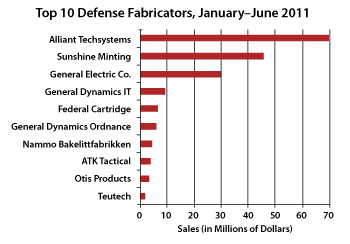Military Data Analyst
- FMA
- The Fabricator
- FABTECH
- Canadian Metalworking
Categories
- Additive Manufacturing
- Aluminum Welding
- Arc Welding
- Assembly and Joining
- Automation and Robotics
- Bending and Forming
- Consumables
- Cutting and Weld Prep
- Electric Vehicles
- En Español
- Finishing
- Hydroforming
- Laser Cutting
- Laser Welding
- Machining
- Manufacturing Software
- Materials Handling
- Metals/Materials
- Oxyfuel Cutting
- Plasma Cutting
- Power Tools
- Punching and Other Holemaking
- Roll Forming
- Safety
- Sawing
- Shearing
- Shop Management
- Testing and Measuring
- Tube and Pipe Fabrication
- Tube and Pipe Production
- Waterjet Cutting
Industry Directory
Webcasts
Podcasts
FAB 40
Advertise
Subscribe
Account Login
Search
Finding fabricating opportunities in the defense sector
The first step is cracking government codes
- By Tom Gerbe
- September 9, 2011
- Article
- Shop Management
A comparison of the top 10 companies from the Fab 40 (“Fab 40: Back to Business,” The FABRICATOR®, June 2011, p. 50) with a database of defense contracts revealed a surprising discovery: Most of the companies in the top 10 fabricate for the government, but very few of them make direct sales to the Defense Department. Many companies have a Commercial and Government Entity (CAGE) code, which is required to sell to the government, but quite a few are expired. It is apparent that these companies must be selling through a third party, possibly a prime contractor.
The results of this comparison lead to a number of questions: Could it be that these companies have no experience in dealing directly with the government? Are they lacking the required personnel to navigate the murky waters of defense contracting? Is it just easier to sell to prime contractors, and leave the extensive documentation, government inspections, packaging requirements, and other inconveniences to them? Is it possible that fabricators have tried to find defense contracts but were unsuccessful?
Metal fabrication is similar to many other industries in that the bulk of the defense contracts are awarded to a handful of large companies (see Figure 1), which then subcontract to smaller companies. This is the opposite of what the Defense Department is trying to encourage, which is greater competition. In an effort to trim defense spending, in February 2010 the Defense Department issued an interim rule to increase competition in major defense acquisition programs. It required prime contractors to provide technical data packages that once were considered proprietary information, making it easier for small companies to get in on the act. The intent was to increase the number of suppliers of hard-to-find items.
Missed Opportunities
Many companies that are new to government bids make common mistakes, regardless of industry. Often companies classify themselves incorrectly, and they frequently use the wrong terminology to search for government bids. An effective search for defense contracts requires thinking the way a government purchasing agent thinks. This isn’t necessarily intuitive. In fact, the information provided by buying agencies in the request for quotation (RFQ) process can vary from center to center.
For example, it’s straightforward that metal fabricators are classified in North American Industry Classification System (NAICS) category 332. However, some agencies use codes other than NAICS, such as Federal Supply Classification (FSC), military standards (which bear the prefix MIL-STD), military specifications (MIL-SPEC), or keywords that describe the requirement. For example, NAICS 332116 is “metal stamping,” but contracts for this category can be found under FSC 9905, J038, 3445, 6625, 9640, 3426, 6160, 9910, 3442, 5335, 1560, 5365, 8140, 5340, 8115, 2510, 9520, 2590, and 5975. A combination search for this FSC list and the keyword “washer” or “shim” would yield more accurate and complete results.
Keeping the Codes Straight
Fabricators must keep in mind that some of these code systems apply to the industry; others apply to the products. For example, the NAICS describes the company’s industry, and therefore is neither intended for nor well-suited to searching for government contracts. The NAICS was developed for another purpose: It was devised by the Office of Management and Budget (OMB) for use by federal agencies in classifying business establishments for the collection, tabulation, presentation, and analysis of statistical data describing the U.S. economy.
The product classification system used by the DOD is the Federal Cataloging Program (FCP), which was established in 1952. This system is currently used by the four military branches, other DOD divisions, civilian agencies, and foreign governments.
To keep the codes straight, and to think like government purchasing agents think, you should keep in mind that the government buys things, not processes. It classifies items it purchases by the items’ characteristics, answering the simple question, “What is it?” How it is manufactured is irrelevant.
Here’s an example of a product description:
PLATE, STRUCTURAL

Figure 2: A search for companies in three industries that pertain to defense spending—metal stamping (NAICS code 332116), hardware manufacturing (332510), and small-arms ammunition manufacturing (332992)—shows that the top 10 suppliers are large companies. Among the Fab 40 fabricators, none appear in the top 10.
NSN 1560-01-578-9126
BOEING P/N 30-2922
The technical characteristics list aluminum alloy 2024 as the material. A fabricator would ask, “How is this manufactured?” but the bid solicitation doesn’t specify how the item is to be manufactured. It doesn’t specify plasma cutting, machining, laser cutting, or any other process. It lists the basics only—the item name, part number, and quantity. Searching the technical characteristics is the key to finding bids like this.
A Better Way
Fabricators who want to get involved in this line of work need to focus on products they are able to make, not processes they use to make them.
- First, set up bid searches using FCP code and terminology to describe the item, not the process used to manufacture it. For example, use a word that describes the product (“plate”) but not the process (“welding” or “machining”).
- When viewing open bids, quickly glance at the technical characteristics and item name.
- Look at the procurement pricing history, number of buys, and quantities sold per order.
- View the number of sources for a single item.
After reviewing that information, consider other criteria that you determine. For example, if you see that an item is purchased repeatedly or has only one supplier, it may be worth investigating. If you can compete, you should submit a bid—you might win the business.
About the Author
Tom Gerbe
BidLink.net
29313 Clemens Road #2-A
Westlake, OH 44145
866-226-4488
subscribe now

The Fabricator is North America's leading magazine for the metal forming and fabricating industry. The magazine delivers the news, technical articles, and case histories that enable fabricators to do their jobs more efficiently. The Fabricator has served the industry since 1970.
start your free subscription- Stay connected from anywhere

Easily access valuable industry resources now with full access to the digital edition of The Fabricator.

Easily access valuable industry resources now with full access to the digital edition of The Welder.

Easily access valuable industry resources now with full access to the digital edition of The Tube and Pipe Journal.
- Podcasting
- Podcast:
- The Fabricator Podcast
- Published:
- 04/16/2024
- Running Time:
- 63:29
In this episode of The Fabricator Podcast, Caleb Chamberlain, co-founder and CEO of OSH Cut, discusses his company’s...
- Trending Articles
Capturing, recording equipment inspection data for FMEA

Tips for creating sheet metal tubes with perforations

Are two heads better than one in fiber laser cutting?

Supporting the metal fabricating industry through FMA

Hypertherm Associates implements Rapyuta Robotics AMRs in warehouse

- Industry Events
16th Annual Safety Conference
- April 30 - May 1, 2024
- Elgin,
Pipe and Tube Conference
- May 21 - 22, 2024
- Omaha, NE
World-Class Roll Forming Workshop
- June 5 - 6, 2024
- Louisville, KY
Advanced Laser Application Workshop
- June 25 - 27, 2024
- Novi, MI



























